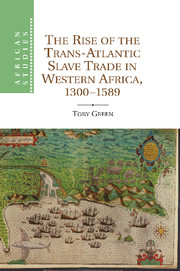Book contents
- Frontmatter
- Contents
- List of Maps
- Acknowledgements
- Abbreviations
- Glossary
- Introduction Rethinking the Trans-Atlantic Slave Trade from a Cultural Perspective
- Part One The Development Of An Atlantic Creole Culture In Western Africa, Circa 1300–1550
- Part Two Creolisation And Slavery
- 6 The Early Trans-Atlantic Slave Trade from Western Africa
- 7 Trading Ideas and Trading People
- 8 Cycles of War and Trade in the African Atlantic, circa 1550–1580
- 9 Creole Societies and the Pan-Atlantic in Late-Sixteenth-Century Western Africa and America
- Conclusion Lineages, Societies and the Slave Trade in Western Africa to 1589
- Bibliography
- Index
6 - The Early Trans-Atlantic Slave Trade from Western Africa
from Part Two - Creolisation And Slavery
Published online by Cambridge University Press: 05 November 2011
- Frontmatter
- Contents
- List of Maps
- Acknowledgements
- Abbreviations
- Glossary
- Introduction Rethinking the Trans-Atlantic Slave Trade from a Cultural Perspective
- Part One The Development Of An Atlantic Creole Culture In Western Africa, Circa 1300–1550
- Part Two Creolisation And Slavery
- 6 The Early Trans-Atlantic Slave Trade from Western Africa
- 7 Trading Ideas and Trading People
- 8 Cycles of War and Trade in the African Atlantic, circa 1550–1580
- 9 Creole Societies and the Pan-Atlantic in Late-Sixteenth-Century Western Africa and America
- Conclusion Lineages, Societies and the Slave Trade in Western Africa to 1589
- Bibliography
- Index
Summary
One of the principal tasks of humanists and intellectuals is supposed to be to come up with new perspectives on the nature of human existence. Yet anyone who gives the matter a moment’s thought is well aware that it is very difficult to come up with anything new at all to say on such matters. For instance, the process of globalisation, touted so widely by economists and political scientists since the end of the 1990s, is hardly anything new. As scholars such as Janet Abu-Lughod and Serge Gruzinski have shown, globalisation really dates back to the sixteenth century, if not before.
Most scholarship on this early period tends to deal with interchanges between Europe and the New World in the era of the Spanish conquest of America. Yet the omission of Africa from this picture is a grave mistake. As the locus of the birth of the first Atlantic Creole culture, Western Africa was vital in the earliest globalisation of economies and ideas influencing the wider Atlantic world. Yet the channels of influence cut in both directions. As the epicentre of the first trans-Atlantic slave trade from circa 1520 to the 1580s, events here prefigured and influenced those which happened later on elsewhere, but were themselves determined in part by the cycle of demand from America and Europe.
- Type
- Chapter
- Information
- Publisher: Cambridge University PressPrint publication year: 2011



